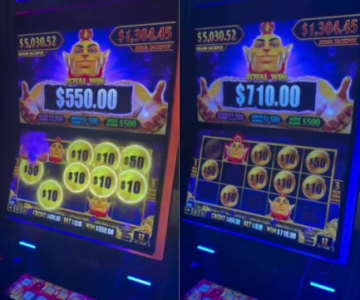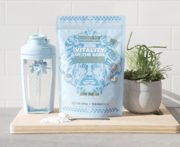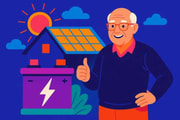Your grandkids are being targeted by pokies on social media—experts say you need to act NOW
By
Maan
- Replies 1
Poker machines have long been a source of controversy—but now, a new twist is drawing alarm from the nation’s top doctors.
A surprising group is being accused of promoting risky behaviour in a way regulators didn’t see coming.
Here’s why medical experts are calling for urgent action on an emerging trend taking over social media.
The Australian Medical Association has sounded the alarm on a fast-growing trend they say could glamorise dangerous gambling behaviour among young people.
Social media influencers, some with large followings, have begun sharing videos of themselves pouring hundreds of dollars into poker machines—often in exchange for new followers or likes.
Public health experts warned the phenomenon could undermine years of harm minimisation work and open the door to a new generation of gambling-related harm.
Dr Danielle McMullen, president of the AMA, did not hold back in her assessment.
‘They are clearly targeted at young people and seek to glamorise what is a dangerous habit and not one we would encourage people to take part in,’ she said.
‘These videos show that our regulations around gambling just aren’t keeping up with the 21st century. They are essentially ads for gambling and our governments need to take a long hard look about how we get on top of this content.’
The concerns followed the release of a new report commissioned by the Victorian government, which estimated the social cost of gambling in the state had doubled—from $7 billion in 2014–15 to $14 billion in 2022–23.
The increase came despite fewer people gambling overall. Researchers suggested that those who did gamble—particularly those at higher risk of harm—were spending more money and experiencing greater losses.
The figures took into account tangible costs like bankruptcy, as well as less visible impacts such as emotional distress and depression.
Videos showed influencers playing poker machines on camera and promising to continue until a certain number of users followed them.
Others showcased jackpot wins, like one user turning $5 into $164,000, but failed to include any context about losses.
Many of these videos lacked the responsible gambling messages that are legally required in broadcast ads, podcasts and other gambling-related promotions.
Source: Instagram/australiagamble
More troubling still, several of these videos could easily be viewed by children and teenagers.
Dr Mark Johnson, a senior lecturer at the University of Sydney who has studied the intersection of gambling and social media, said the rise of influencers focused on poker machines was ‘an incredibly new phenomenon’.
‘We’re seeing people who have already built significant followings shifting into gambling content in recent years, while we’ve also seen people starting off with this kind of content and trying to reach the status of an influencer,’ he said.
‘This is then a wholly contemporary thing, and there’s almost no research on it.’
Public health campaigners have expressed alarm at the potential consequences, warning that such content may be introducing young people to poker machines long before they are legally allowed to use them—normalising risky behaviour and sidestepping conventional advertising regulations.
Social media company Meta, which owns one of the platforms where the content has appeared, said it had strict rules about gambling promotion and would ‘remove any content that does not comply with our standards as soon as we become aware’ of it.
‘Both the advertiser and creator must obtain written permission to promote real money gambling and must comply with all applicable Australian laws and regulations,’ a Meta spokesperson said.
However, questions remained over whether these influencer posts technically qualified as advertisements, as they did not appear to be sponsored by gambling companies or venues. Many of the videos had remained online for weeks.
The Australian media regulator has also stepped in, following an earlier investigation that found social media influencers were inadvertently promoting an offshore gambling company banned from targeting Australian consumers.
Some videos featured company names, links to overseas websites, and financial incentives to create new accounts.
In response, the regulator warned influencers they could face fines of up to $59,400 for ‘promoting or publicising illegal online gambling services’.
Meta noted that it used a ‘strike system to hold advertisers and creators accountable for the content they post’, which could lead to restrictions or even account bans for repeat offenders.
The Australian Influencer Marketing Council added that education for creators was still lacking.
‘Many creators engaging in affiliate marketing may not fully understand the regulatory frameworks in which they operate,’ a spokesperson said.
What began as isolated posts has grown into a wider pattern—one with major implications for Australia’s ongoing battle against gambling harm.
With mounting pressure on both social media platforms and lawmakers, public health experts say the next steps will determine whether this emerging threat is stamped out or allowed to flourish.
As younger generations are exposed to these machines through social media, it’s clear the problem is evolving—not disappearing.
If you’re curious about how poker machines have affected Australian communities more broadly, there’s another story worth reading.
Read more: How poker machines are hurting Australia
If you or someone you know is experiencing gambling harm, help is available. In Australia, call Gambling Help Online at 1800 858 858 or the National Debt Helpline at 1800 007 007.
In the UK, contact the NHS National Problem Gambling Clinic at 020 7381 7722 or GamCare at 0808 8020 133. In the US, call 800-GAMBLER or text 800GAM.

As gambling content continues to evolve online, many fear it’s becoming harder to protect younger generations from its influence.
For older Australians who’ve seen how pokies have impacted families and communities over the decades, this new trend may feel all too familiar—just in a modern disguise.
Have you noticed gambling becoming more visible or normalised in everyday media?
A surprising group is being accused of promoting risky behaviour in a way regulators didn’t see coming.
Here’s why medical experts are calling for urgent action on an emerging trend taking over social media.
The Australian Medical Association has sounded the alarm on a fast-growing trend they say could glamorise dangerous gambling behaviour among young people.
Social media influencers, some with large followings, have begun sharing videos of themselves pouring hundreds of dollars into poker machines—often in exchange for new followers or likes.
Public health experts warned the phenomenon could undermine years of harm minimisation work and open the door to a new generation of gambling-related harm.
Dr Danielle McMullen, president of the AMA, did not hold back in her assessment.
‘They are clearly targeted at young people and seek to glamorise what is a dangerous habit and not one we would encourage people to take part in,’ she said.
‘These videos show that our regulations around gambling just aren’t keeping up with the 21st century. They are essentially ads for gambling and our governments need to take a long hard look about how we get on top of this content.’
The concerns followed the release of a new report commissioned by the Victorian government, which estimated the social cost of gambling in the state had doubled—from $7 billion in 2014–15 to $14 billion in 2022–23.
The increase came despite fewer people gambling overall. Researchers suggested that those who did gamble—particularly those at higher risk of harm—were spending more money and experiencing greater losses.
The figures took into account tangible costs like bankruptcy, as well as less visible impacts such as emotional distress and depression.
Videos showed influencers playing poker machines on camera and promising to continue until a certain number of users followed them.
Others showcased jackpot wins, like one user turning $5 into $164,000, but failed to include any context about losses.
Many of these videos lacked the responsible gambling messages that are legally required in broadcast ads, podcasts and other gambling-related promotions.
Source: Instagram/australiagamble
More troubling still, several of these videos could easily be viewed by children and teenagers.
Dr Mark Johnson, a senior lecturer at the University of Sydney who has studied the intersection of gambling and social media, said the rise of influencers focused on poker machines was ‘an incredibly new phenomenon’.
‘We’re seeing people who have already built significant followings shifting into gambling content in recent years, while we’ve also seen people starting off with this kind of content and trying to reach the status of an influencer,’ he said.
‘This is then a wholly contemporary thing, and there’s almost no research on it.’
Public health campaigners have expressed alarm at the potential consequences, warning that such content may be introducing young people to poker machines long before they are legally allowed to use them—normalising risky behaviour and sidestepping conventional advertising regulations.
Social media company Meta, which owns one of the platforms where the content has appeared, said it had strict rules about gambling promotion and would ‘remove any content that does not comply with our standards as soon as we become aware’ of it.
‘Both the advertiser and creator must obtain written permission to promote real money gambling and must comply with all applicable Australian laws and regulations,’ a Meta spokesperson said.
However, questions remained over whether these influencer posts technically qualified as advertisements, as they did not appear to be sponsored by gambling companies or venues. Many of the videos had remained online for weeks.
The Australian media regulator has also stepped in, following an earlier investigation that found social media influencers were inadvertently promoting an offshore gambling company banned from targeting Australian consumers.
Some videos featured company names, links to overseas websites, and financial incentives to create new accounts.
In response, the regulator warned influencers they could face fines of up to $59,400 for ‘promoting or publicising illegal online gambling services’.
Meta noted that it used a ‘strike system to hold advertisers and creators accountable for the content they post’, which could lead to restrictions or even account bans for repeat offenders.
The Australian Influencer Marketing Council added that education for creators was still lacking.
‘Many creators engaging in affiliate marketing may not fully understand the regulatory frameworks in which they operate,’ a spokesperson said.
What began as isolated posts has grown into a wider pattern—one with major implications for Australia’s ongoing battle against gambling harm.
With mounting pressure on both social media platforms and lawmakers, public health experts say the next steps will determine whether this emerging threat is stamped out or allowed to flourish.
As younger generations are exposed to these machines through social media, it’s clear the problem is evolving—not disappearing.
If you’re curious about how poker machines have affected Australian communities more broadly, there’s another story worth reading.
Read more: How poker machines are hurting Australia
If you or someone you know is experiencing gambling harm, help is available. In Australia, call Gambling Help Online at 1800 858 858 or the National Debt Helpline at 1800 007 007.
In the UK, contact the NHS National Problem Gambling Clinic at 020 7381 7722 or GamCare at 0808 8020 133. In the US, call 800-GAMBLER or text 800GAM.
Key Takeaways
- Doctors warned that influencers are glamorising poker machine use by posting videos without responsible gambling messages.
- A Victorian report showed gambling’s social cost had doubled to \$14 billion despite fewer people gambling overall.
- Experts raised concerns that teens could easily access these videos, normalising risky behaviour before legal age.
- Regulators and social media platforms are under pressure to act, with creators facing potential fines for illegal promotions.
As gambling content continues to evolve online, many fear it’s becoming harder to protect younger generations from its influence.
For older Australians who’ve seen how pokies have impacted families and communities over the decades, this new trend may feel all too familiar—just in a modern disguise.
Have you noticed gambling becoming more visible or normalised in everyday media?








